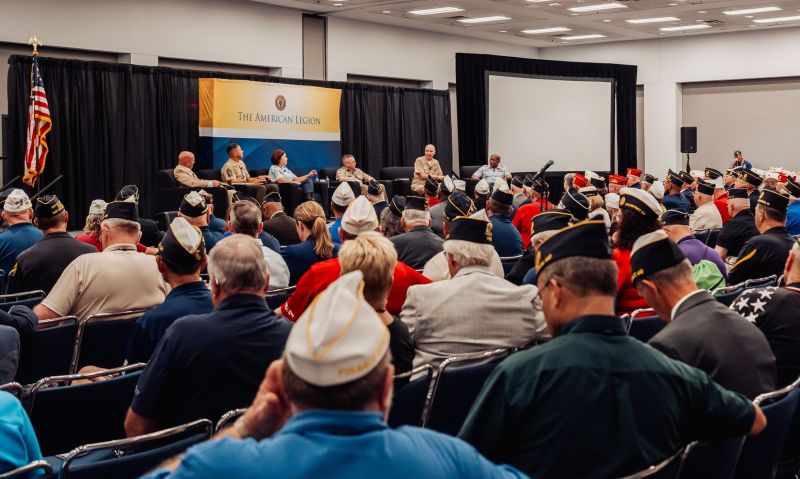
A panel of senior military leaders addressed mental health, housing, pay and other critical issues related to improving conditions for servicemen and women during The American Legion’s National Security Commission meeting.
Senior military leaders convened for a special Military Quality of Life panel discussion during The American Legion’s National Security Commission meeting Aug. 26 during the organization’s national convention in Charlotte, N.C.
The military leaders discussed issues affecting the quality of life for servicemembers and their families ranging from mental wellness to child care to housing. In 2022, The American Legion created the Base Assessment and Servicemember Experience (BASE) program to address quality of life matters that affect servicemembers and their families.
Jason M. Vanderhaden, the 13th master chief petty officer of the Coast Guard, moderated the panel. The panelists were 20th Sgt. Major of the Marine Corps Carlos Ruiz, 19th Chief Master Sgt. of the Air Force JoAnne Bass, Army Sgt. Major Michael J. Perry III, the Senior Enlisted Leader to the Deputy Chief of Staff, Navy Command Master Chief Matthew Harris and Tony L. Whitehead, a senior noncommissioned officer in the Air Force and the sixth Senior Enlisted Advisor to the Chief of the National Guard Bureau.
Bass praised the Legion for reaching out to work with the service branches to improve quality of life for troops. “Your membership through The American Legion is extremely helpful,” she said. “I’ve been watching on Capitol Hill some of the things you all are advocating for. And that means a lot when it comes to health care, pay compensation and education. We have got to make sure we are properly compensated. No servicemember ever should be on food stamps. No servicemember should have to worry about their next paycheck.”
Ruiz underscored the importance of why quality of life matters.
“Quality of life — what is that? To you, it is something; to you, it is something different; to everyone, it is something different,” he said. “But what I do know is that it is something constant. The key word is quality — the quality of people — that we must bring in.”
Among the topics addressed in front of more than 400 American Legion members:
• Mental health services: The topic is a priority for The American Legion, as part of its Be the One initiative to reduce the rate of suicide among veterans and servicemembers. “A couple of years ago we had a significant spike,” Perry said. “What we are instituting from an Army perspective is 100% wellness checks for every servicemember. Wellness checks start with leadership. This is where noncommissioned officers really have to get in there and embrace their responsibilities. But then it also is leveraging family lifestyle counselors, our chaplains and a myriad of other folks who can do checks. Then those folks who have the greatest need, we will send them to behavior health care specialists.”
• Child care: Bass said all branches have advocated and spoken out for the need for modernized child care. “If you look at our military family today, compared with 30 something years ago when I came in, it looks very different. You have more people who are dual working and you have more single parents. We haven’t really changed our model in child care. We have a summit coming up in September and are pushing to say we need a different model. Child care is a readiness issue.”
• Housing: Perry said that the Army has committed $1 billion over the next 10 years to improve housing conditions, “to build new ones and to renovate some of the barracks that are older.” Ruiz pointed out that the Marines allocated much of their funding to fighting the 20-year war in Afghanistan, and housing conditions suffered. “We were underinvested in basics. There was a long period of time when we had to decide. And you’re going to be mad at me but the barracks aren’t going to get these things in order to bring you home. But that is not enough anymore. The time has finally come to invest in our Marines. They are not whining for things, they just don’t want mold in the barracks. If we can commit to them, then maybe they can commit back to us, not just four years but maybe 20 years.”
• Work and home life: Harris focused on the quality of service, citing an example under way at the Hampton Roads shipyard where they are studying sailors’ access to food, medical care and housing. “We’re going to take what we learned there and build it out and take it elsewhere to other shipyards and bases.” The Navy has allocated $11 million to make quick fixes to address some of these concerns by the end of the year, he said.
• Paying the Coast Guard: Vanderhaden praised The American Legion for its support of the Coast Guard, especially during the most recent government shutdown which prevented Coasties from being paid. “The American Legion came in big for the Coast Guard raising more than $1 million, which was hugely helpful,” he said, also noting The American Legion-supported Pay Our Coast Guard Act, which is stalled in Congress. “We really appreciate the advocacy of the Legion.”
American Legion National Commander Vincent J. "Jim" Troiola closed the meeting by sharing what he has learned while visiting base installations from coast to coast. He shared a comment from a Coast Guard third class petty officer he met during his visit in January to Coos Bay, Ore.
“He told me, ‘Commander, no matter how bad it gets, we’re always there to do our mission.’ And that really meant a lot to me.”
- Convention

